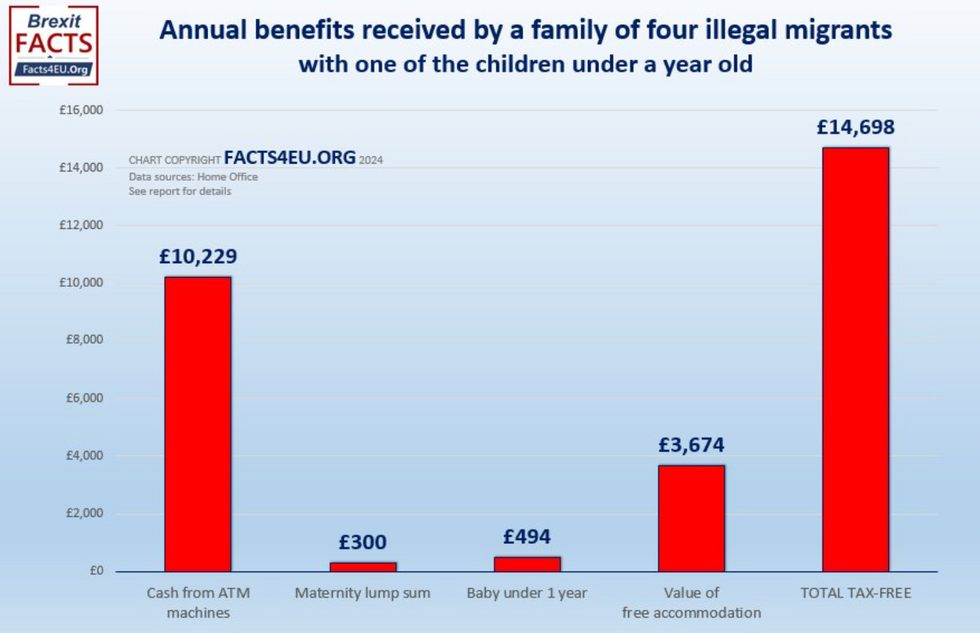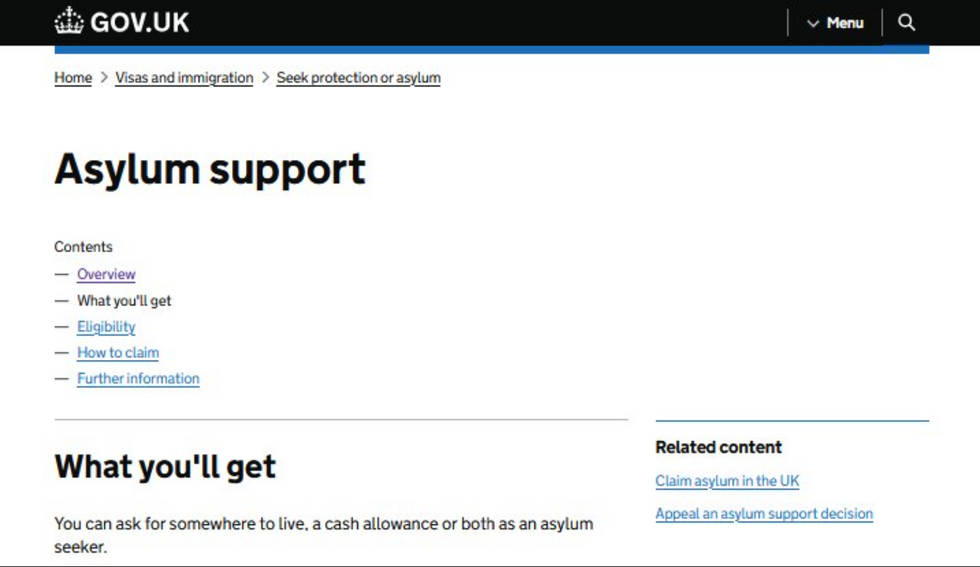Illegal migrants in the UK are not required to contribute to the state
Getty
A family of four can receive the equivalent of £15k per year tax-free, plus many other benefits
Don't Miss
Most Read
Trending on GB News
As illegal migrants cross the English Channel to the UK in record-breaking numbers, the government continues to provide generous benefits on their arrival.
In an exclusive from GB News in partnership with Facts4EU we take a look at the UK's generosity to illegal migrants and reveal exactly what they are entitled to when they reach UK shores.
The provisional total for migrant crossings from France to the UK this year stands at 16,457, according to the Home Office.
The previous record for arrivals in the seven months from January to July was 16,420 in 2022, with 14,732 making the journey in the same period last year.

This graph shows the annual benefits received by a family of four illegal migrants
© Brexit Facts4EU.Org 2024
Illegal migrants in the UK are not required to contribute to the UK state and are allowed to apply for several tax-free benefits, as listed below.
- Accommodation: A flat, house, hotel, hostel or bed and breakfast
- Weekly cash allowance: £49.18 per person per week, on a cash card
- Or £8.86 per person if your accommodation provides your meals
- Free education for your children
- Free school meals
- Free NHS healthcare and free prescriptions
- Free access to a dentist and free dental care
- Free eyesight tests and help paying for glasses
Illegal migrants can also apply for extra money for food if they're pregnant or a mother of a child aged 3 or under:
- Pregnant mother: extra £5.25 per week
- Baby under 1 year old: extra £9.50 per week per baby
- Child aged 1 to 3: extra £5.25 per week per baby
- Maternity payment: extra £300 if your baby is due in < 11 weeks, or if your baby is < 6 months old
- Free translation service with all authorities
- Replacement mobile phone
There are also annual benefits received by a family of four, with one of the children under a year old including:
- Cash: £10,229
- Maternity lump sum: £300
- Baby under 1 year: £494
- Value of free accommodation: £3,674
- TOTAL TAX-FREE: £14,698

The provisional total for migrant crossings from France to the UK this year stands at 16,457
GettyA migrant family also does not have to pay for rent, income tax, National Insurance contributions, electric or gas bills, water bills, council tax, mobile phone bills, public transport tickets, prescription costs or dental care.
GB News with Facts4EU also discovered that if illegal migrants are refused asylum they will still receive most of the benefits listed above.
Individuals are able to apply for asylum support if they are homeless or do not have the money to buy food through the Gov.uk website.
Figures from the Home Office show between 1 January 2021 and 31 December 2023, 77,304 asylum claimants were identified for consideration on inadmissibility grounds.
From these figures, "47,993 individuals were subsequently admitted into the UK asylum process for substantive consideration of their asylum claim."
Some "34, 113 'notices of intent’ were issued to individuals, to inform them that their case was being reviewed to determine whether removal action on inadmissibility grounds was appropriate and possible."
Another "84 individuals were served with inadmissibility decisions, meaning the UK would not admit the asylum claim for consideration in the UK system, because another country was considered to be responsible for the claim, owing to the claimant’s previous presence in, or connection to a safe country."
Finally, there were "25 enforced removals of individuals considered for removal on inadmissibility grounds who were returned to Belgium, Bulgaria, Denmark, France, Germany, Ireland, Italy, Slovenia, Spain, Sweden and Switzerland," according to the Home Office.
The Home Secretary has set out a change to the law to remove the retrospective application of the Illegal Migration Act which will allow decision-makers to decide asylum claims from individuals who have arrived in the UK since 7 March 2023 that have been put on hold.
That change according to the Home Office allows them to restore order to the asylum system by resuming asylum decision-making and starting to clear the backlog.

Individuals can apply for asylum support on the Gov.UK website
UK Government
LATEST FROM MEMBERSHIP:
A Home Office spokesperson said:"It is a legal requirement for the government to ensure that – as long as individuals are stuck in the asylum system – they do not fall into destitution.
"But that is also why it is a financial necessity to start clearing the asylum backlog so that those costs do not continue to mount up as they have done in recent years. That is the process the new government has started, which will deliver significant savings in asylum costs over time.”
It is important to note this data refers to what illegal migrants are entitled to when entering the country, not legal migration.
Legal migration can fuel the economy and help host countries to address labour market needs.
With an ageing population in Britain, the country has benefitted from an influx of young legal migrants to its labour force.
Immigrants are usually of working age when they arrive in the UK and tend to have more children than UK nationals, but of course, they too contribute to the UK economy once of age.
Employers also benefit from migration to fill skills shortages for example in nursing, hospital and social care vacancies.







